A Love Affair with Cinema: Anthony Chen talks about Wet Season
As the COVID-19 pandemic causes film festivals around the world to forgo red carpet premieres for online editions, Trevor Hogg revisits the 44th Toronto International Film Festival with a series of interviews…
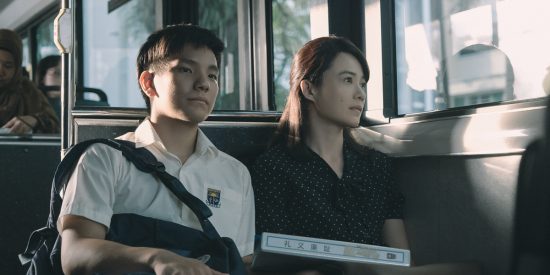
Following the principle preached and practiced by legendary filmmaker Steven Spielberg (Raiders of the Lost Ark), Anthony Chen made a series of short films and then transitioned to features. “The shorts were fundamental in me making that step up to feature film filmmaking. A short film is like running a 100-metre race and a feature film is like a marathon. It is quite easy to maintain the same focus and concentration on every frame and ounce of performance on a short because you’re shooting for five or six days. I wouldn’t even need the script and would know on day three what we shot before or after. On a feature by day 15 you’re a bit lost because you never shoot in sequence so you have to look at your script to remember emotionally where you are in terms of what has happened. Having to make other shorts built my skills when it comes to performance or to me onset or where to put the camera. I’m grateful that I went to film school twice. I went to film school at very young age at 17. I made close to 10 years of short films before had my first feature film; that gave me a solid foundation.”
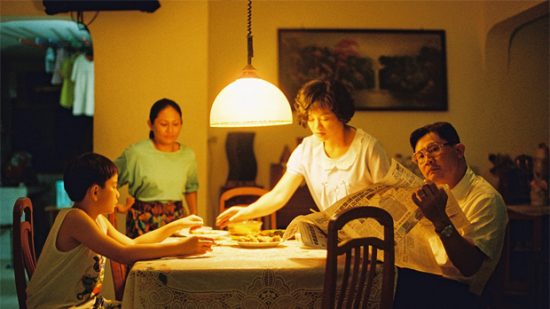
Ilo Ilo
Ilo Ilo (2013) revolves around a petulant child and his nanny, and resulted in the Singapore writer-director being honoured at the Cannes Film Festival, Asia Pacific Screen Awards and Taipei Golden Horse Film Festival and Awards for his feature debut. “A lot of people think that filmmaking gets easier as you get more experience but I’m of the opposite opinion. It gets tougher because as a director the things that you are interested in keep evolving. You get more ambitious whether it’s the way you want to try certain styles or whether it’s the performance or in terms of how you use the camera. There are new aims and goals that you try to go for. If you’re reshooting the same film again and again it would get easier. Even though Ilo Ilo won a lot of prizes such as the Caméra d’Or and got seen in a lot of places, moving into the second feature film I’m not sure that I could put hand to heart and tell you, ‘I know how to make a feature film.’ I’m still figuring out how to make a feature film. My film after Wet Season (2019) is going to be my first English language film set in the UK and it’s with Caucasian actors. It’s going to be something completely different as well.”
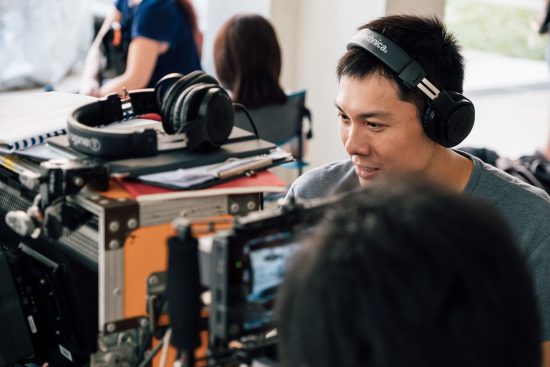
A filmmaking tradition is to establish an inner circle of creative talent. “There are a few collaborators I will always work with such as editor Hoping Chen and now there is a producer I really like,” states Chen. “There is a core team that evolves and changes from time to time depending on the project. Everyone has different priorities in life. A lot of the people I worked with on short films over the years have moved onto other industries or jobs. In the end you have to be the one holding onto the passion. You can’t hold people to the same pedestal. At some point there are other things to think about. I’ve got a family to feed. I need to make proper money now!” For his sophomore effort Chen wrote and directed Wet Season which centres on a married teacher taking fertility drugs who has an affair with a student. “I take a long time writing which is why a lot of people are saying, ‘It’s six years later that you made your second film.’ I have to slowly find it. By the time I start shooting I need to fully understand what all of these characters are going through, what are they about, their background and motivations. I need to be able to play every single character. Even the old man or principal. I don’t believe I could make a film if I can’t convince myself. I need to feel it in my gut.”
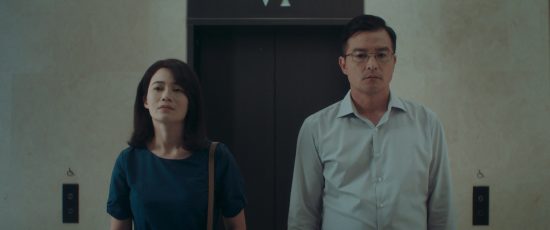
“My shooting script is precise,” explains Chen. “Every single description or nuance or action is written into it. But when I’m writing it’s erratic. I don’t write from the start to the end. I have a sense of what the story is about. I would write the starting scene and have the end, and bits here and there but they do not connect. The post process was chaotic and erratic as well. I went to the National Film and Television School in the UK and one of the teachers who taught me was Paweł Pawlikowski [Cold War] and he is like that as well. It comes from everywhere. That’s the reason why we connected well as teacher and student. It’s all there. This is the blueprint. We’re all going to follow it. I wouldn’t even allow my actors to change a single line or word. That’s how dogmatic I am.” Improvisation is allowed. “If it’s not working, I’ll say, ‘Lets do it my way.’ I’m sensitive to performance as I was a child actor. I was in a lot of children’s theatre and musicals between the age of 10 and 18. When I write script or there is a role or scene, I know how to play the beats and the part. When it’s not right and it’s not coming out, I literally know what’s wrong with it.”
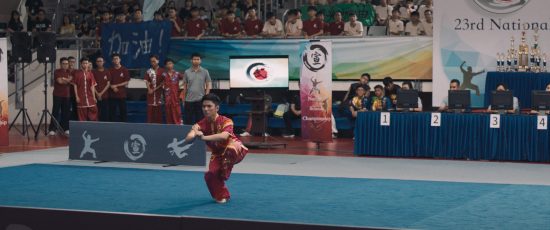
Storyboards did not have a significant role in the preproduction process. “Years ago, when I was at film school and had to build the set according to how I was going to shoot it, I had storyboards,” recalls Chen. “But now I have stopped storyboarding. For me it’s important that it’s in my head and I would have discussions with the DP and block out the scene. It’s about where is the best place the camera and I’m not one to do lots of coverage. When I work with my editor there are only that many ways to cut the film because I don’t shoot multiple angles.” Multiple cameras are avoided. “It’s a single camera movie. In certain scenes I go, ‘This is the shot and the entire scene is going to be taken in this shot.’ My DP will go, ‘Would you like to punch it? Would you like a close-up?’ I’d say, ‘No. We’re not shooting TV. This is how we’re going to show it and this is where the emotion is going to be felt. This is the right place to put a camera.’”

Chen is not afraid to place the camera behind his actors. “Years ago, I went to a solo exhibition at the Royal Academy in London on Danish painter Vilhelm Hammershøi. Most of his portraits are the backs of women. You don’t see their faces. I find it emotional and there’s so much storytelling.” The same idea applies to having the camera shoot from backseat. “Interestingly, you don’t read their faces too much but there’s so much emotion conveyed; that’s the power of cinema. There’s so much stuff that you can say without being upfront about it. Sometimes a wide shot of the back of someone is more moving than a close-up where someone is crying or tearing. I worry for cinema these days because everyone is into big close-ups. It feels like everyone is shooting television instead of cinema. The glory of cinema used to be about how characters connect in spaces.” Change needs to be embraced. “It’s always that negotiation of, ‘Am I being self-indulgent, holding onto the wrong things or there’s a better way?’ I always believe that good filmmakers have to have a strong sense of self-awareness. I’m constantly judging my work. Is this right? Or questioning myself. Is this the best way to tell this story or scene?
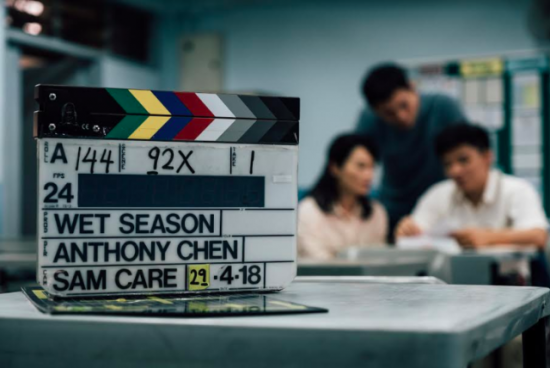
London-based cinematographer Sam Care wanted to shoot Wet Season with an aspect ratio of 4:3. “His reason for it was this is about woman who has always been trapped,” explains Chen. “There are a lot of great films such as Ida and Cold War that are 4:3. But I do worry, especially from the territories I come from in Asia where it’s not a mature audience, that they might go, ‘What is this? Is this an art installation?’ That is why we eventually went for 2.39:1 aspect ratio and it worked well. For me, a lot of the language in the film is about people in spaces. A sense of her loneliness and her entrapment in a space. More than physically entrapping her in a frame.” Rain is prominent both visually and thematically. “When I write there are images that you hold onto so closely to your heart and stay on when you want to execute the film. There will be stuff that gets thrown out of the window and you rethink it and have discussions with the DP. Then it becomes something else. There is a shot after the dream sequence when the father-in-law dies, it’s pouring and she goes to close the window. When I was writing it I knew that it was all going to be done in that one shot.”
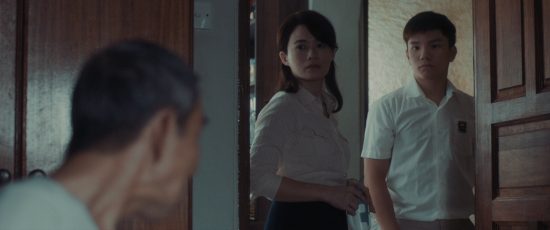
Everything was shot on location. “It’s very hard because Singapore is small and bureaucratic,” notes Chen. “We couldn’t find a school that would allow us to shoot. In the end we shot in an empty school. We had to ask the Ministry of Education to allow us to takeover the school for a month. We had to dress it up and there was no electricity. We had to re-cable the school and bring in temporary lavatories. There is so much work going into the logistics of executing something simple. Likewise, it was such a thrill writing rain into the film but when it came to the execution, I’m not sure I’ll ever write another rain scene again! There are zero visual effects. Every single drop of rain is created as a practical effect. Even the small traffic jam scene where it’s pouring, we got rows and rows of huge water towers and huge water trucks everywhere.”

Being able to navigate tight and small spaces like car interiors led to the footage being captured on an ARRI ALEXA Mini camera. “I fought to shoot on film but there is no film lab any more in Singapore,” reveals Chen. “I started going to film school shooting on 16mm and later on 35mm. I was the last batch of students who had the option to literally cut a film on a Steenbeck and the negative. I’m a purist. When I moved to digital for my first feature, the closest thing to film is the ALEXA. I really didn’t like the clean digital DCP look that we see in cinemas. Everything looks so stark and sharp. It’s like watching a huge HD screen; that isn’t cinema. We added a lot of grain when we were grading Wet Season. For me, it’s always about trying to go for a film look. There are certain colours that wouldn’t be chemically possible on film. We were referencing Kodak stock that would generate a certain template or colour scheme. It looks like a simple but there is a lot of thought going into it.”
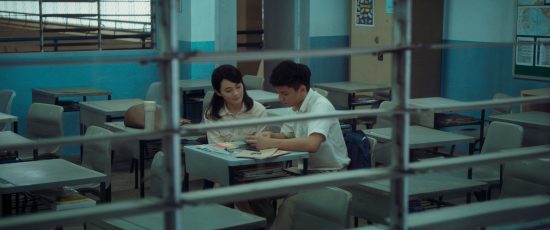
Lighting is an important part of the conveying the right mood and aesthetic. I’m picky about lighting,” admits Chen. “I remember there was a scene we were shooting and the DP veered away from what I thought it should be; he decided to smoke up the house and have a high key light. I was like, ‘This looks like a Disney film.’ Yes, it’s the end of the film but does it need to feel so sweet? It almost feels too romantic with the soft beautiful light. You could almost see the dust particles because of the smoke. I said, ‘Until we get this lighting right, we’re not going to shoot the scene.’ He re-lighted it and got the smoke machine out. Everyone had to wave out all of the smoke and let it settle. I’m sensitive to light even though technically I’m not a director who can shoot. I can’t measure light. In film school, I always had to have my classmates to do it for me. I just wasn’t good with all of the technical stuff. But yet I’m sensitive to how light plays in the film.”
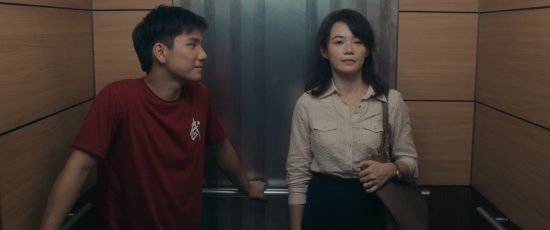
Yeo Yann Yann and Koh Jia Ler, who played mother and son in Ilo Ilo, reunited for the roles of teacher Ling and student Wei Lunin in Wet Season. “I was looking for a new face for this film,” states Chen. “We went to a lot of secondary schools and I saw hundreds of 14, 15 and 16-year olds. 30 of them came to workshops for over a year on weekends, and we would do performance and improv. I couldn’t quite find someone who had a spark that was right. Then one day I was scrolling through Instagram and saw a picture of a boy. I told my producer and said, ‘He’s right for this role.’ My producer said, ‘That’s your actor.’ I said, ‘Oh, my god. He has grownup!’ It had been six years. The first time he was 11. We brought Koh in and he was always rising above the crowd. I was adamant that I wasn’t going to cast Yeo Yann Yann. They have a sex scene and for me, it’s almost short of being incestuous. I wanted someone who was late 30s early 40s and felt from Singapore, or Malaysia. There were only a few choices that I had. Eventually, I was like, ‘Lets bring Yeo Yann Yann.’ It wasn’t entirely what I was going for. Yeo has short hair and a strong domineering masculine feel to her. Whereas there is a gentle fragility in this character. We spent a lot of time working on her image.” Another principal character is the partially paralyzed father-in-law. “Yang Shi-bin is a veteran theatre actor and spent two weeks at a hospital for elderly stroke patients observing them for a long time. We had specialized makeup so we could pull down a side of his face. I love him very much in the film.”
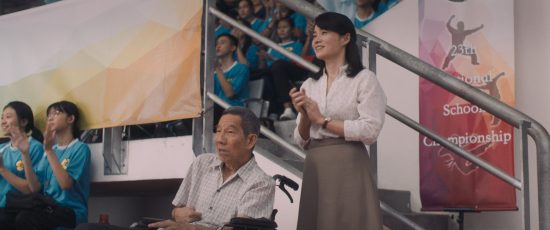
It was quite awkward for Yeo Yann Yann and Koh Jia Ler to do the more intimate scenes. “The sex scene was straightforward,” notes Chen. “We had quite a few rehearsals before that. We knew right away that we needed to give them space for the scene. There was a wide shot so you see his bed and the back of the boy. Then we went intimate for a punch in for a tight close-up. For me, it’s focusing more on the camera. It’s important that the scene feel awkward. If it was like a Hollywood love scene it would have failed. It makes you slightly cringy when you watch it.” Ling learns that she is not pregnant from the fertility drugs while driving a car with Wei Lunin as a passenger. “I wasn’t sure if I was going to do it all in one shot. The idea was that we were going to follow her all of the way until the car stops. Then we would do punch ins. We had to time it with the traffic lights and the cars on the road because we didn’t have a budget to block all of the roads and arrange the cars that we wanted. It was really pouring with rain. I told my script supervisor, ‘That’s it. We don’t need another shot.’ It did what it needed to do and wasn’t too sentimental.”
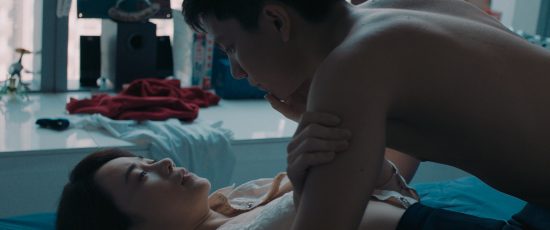
“There were four scenes that we took out completely because we were in repetition mode,” remarks Chen. “Apart from that we didn’t shift things around. I try to be quite precise on the page. What is interesting is that we were more brutal in terms of the pacing in the edit. Even the last shot where you see the sun for the first time, I was with my editor and we had to check that the sun was coming out through the clouds. We literally shot it one day. The timing of how long the sun was coming out of the clouds could easily be like a Stanley Kubrick shot where it took forever. It had to be not one frame too much or too little. Emotionally, it should be just enough.” The soundscape for Wet Season is the rain. You probably wouldn’t feel it if you’re watching it on a small screen or an iPad but at the right level in 5.1 surround sound in a cinema you really feel the atmospheric quality of the rain, like how it changes when the thunder comes. In the screenplay I had written pieces of diegetic music. I knew from the start there was going to be a piece of classical music during the surgery scene but in the end, I chose a piece of opera from Julius Caesar. I knew there was going to be diegetic music when they stop the car and turn the radio on. It wasn’t going to be like, ‘Lets score it from top to end.’ The film didn’t need that.”
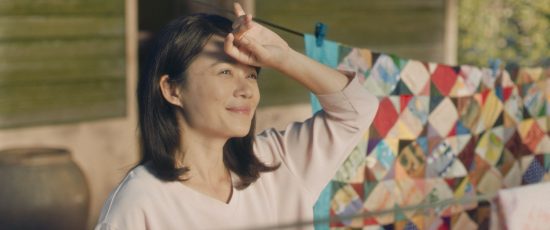
Moments of silence were incorporated into the sound design. “For me there’s huge drama in silence,” states Chen. “We’re so used to having a huge score from the first logo of the film all the way to the end and credits rolling that we have forgot the power of silences. For me, emotion in cinema is sculpted by two things. Silences and pauses. A pause in a performance is like a line of dialogue that says so much about emotion.” Scene transitions are not carefully mapped out. “I’m a huge fan of jump cuts and not joining everything tightly. In a film that doesn’t have music there needs to be a change visually or sonically that stirs you up a little bit. For me, it’s not about just having smooth transitions. I would be wary if everything is too neat. A lot of the tension is because we manipulated shape and energy through what we’re doing in terms of shot size, sound, and rain.”
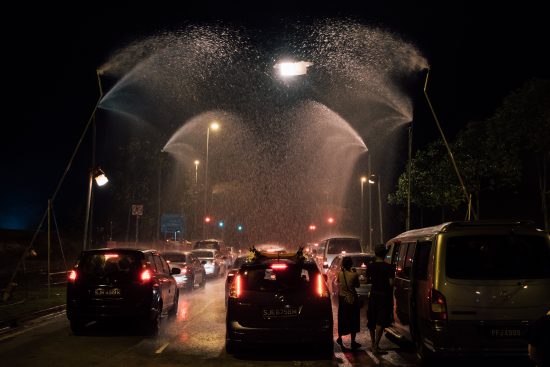
At the 2019 Taipei Golden Horse Film Festival and Awards, Wet Season received nominations for Best Film, Best Director, Best Supporting Actor, and Best Original Screenplay while Yeo Yann Yann won for Best Leading Actress. “I don’t know if I’ll ever shoot rain again unless I’ve got lots of money. Half of our water in Singapore is imported by Malaysia so it’s very expensive. It’s not like Canada where water is almost free because you have so much water supply. One huge tank of water was like $500 USD. At some point we would be pouring all of this rain down and my AD would tell me, ‘We have one left and got two shots.’ We have to get it because we’ll have no water for the day. There was a real pressure to get it right.” A simple scene lingers with Chen. After they are found out by the school headmaster, Ling is walking towards her car and we used a simple zoom to pulled out to reveal Wei Lunin. There’s an elegance in the shot and I find it emotional. We were going to do it as two shots. For a director one of the most satisfying things to do is when you feel that the camera is in the right place and everything comes together beautifully with the light.”
https://www.youtube.com/watch?v=sSgt6AcvDnY
Special thanks to Anthony Chen for taking the time to be interviewed. For more information read our conversation with Yeo Yann Yann and visit the official website for Giraffe Pictures.
Trevor Hogg is a freelance video editor and writer who currently resides in Canada; he can be found at LinkedIn.
Next PostPrevious Post(adsbygoogle = window.adsbygoogle || []).push({});









